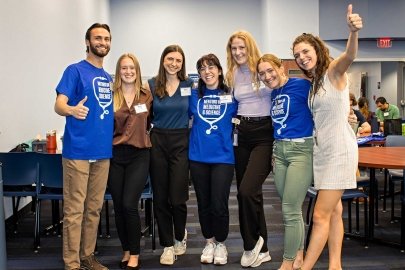At Midwestern University, we believe that supporting a campus culture where everyone feels welcomed and respected leads to innovation, broadened perspectives, and understanding – all of which are foundational aspects of excellence in healthcare education and patient care delivery. Our academic family values and celebrates the multifaceted backgrounds of each and all students, faculty, staff, alumni, and patients, and fostering engagement, respect, and a strong sense of community is a university-wide commitment.
The Office of Multicultural Affairs and Community Outreach (OMACO) provides guidance, leadership, and resources to support the University's goal of maintaining a welcoming and supportive institution for everyone. Throughout the year, in collaboration with other university units, we host enriching cultural immersion events, offer educational presentations that encourage self-reflection and respect for others' viewpoints, and lead community outreach initiatives with a focus on compassionate healthcare delivery and positive social impact. By engaging in these initiatives, our students, faculty, and staff develop a deeper understanding of the wide variety of lived experiences of their classmates, colleagues, and patients, leading to more empathetic and effective communication, better learning and working environments, and enhanced patient care outcomes.
Contact our office at OMACO@midwestern.edu.
Awareness Calendar
Our Awareness Calendar serves as a valuable resource, highlighting a wide spectrum of multicultural and religious holidays and observances distributed across the calendar year.
Related News
Additional Information
Explore student organizations, community resources, and our land acknowledgement.
We have many student clubs and organizations built around various interests, all of which provide opportunities to meet peers, relax, build community, pursue extracurricular interests, participate in hundreds of fun events throughout the year, and engage in meaningful community service activities.
Getting involved also opens doors to leadership development opportunities, and enriches classroom learning. All our student groups play an important role in providing skills to grow into well-rounded, compassionate healthcare providers, and building a welcoming, family-like campus environment.
Please visit our Clubs & Organizations-AZ Campus page to browse our list of current clubs and organizations. All student organizations (with the exception of honor societies, where a specific GPA is required to recognize academic achievement) are open to all Midwestern University students, regardless of college/program affiliation.
We have many student clubs and organizations built around various interests, all of which provide opportunities to meet peers, relax, build community, pursue extracurricular interests, participate in hundreds of fun events throughout the year, and engage in meaningful community service activities.
Getting involved also opens doors to leadership development opportunities, and enriches classroom learning. All our student groups play an important role in providing skills to grow into well-rounded, compassionate healthcare providers, and building a welcoming, family-like campus environment.
Please visit our Clubs & Organizations-Downers Grove Campus page to browse our list of current clubs and organizations. All student organizations (with the exception of honor societies, where a specific GPA is required to recognize academic achievement) are open to all Midwestern University students, regardless of college/program affiliation.
Midwestern University is a welcoming, supportive community that values the unique perspectives and experiences of all individuals. We are committed to creating an environment that encourages learning, collaboration, and engagement across a broad range of backgrounds and experiences. Through education, research, and community involvement, we aim to cultivate a culture of mutual respect and understanding that enhances academic excellence, personal growth, and patient-centered care.
Links and Resources
Midwestern University Health Equity Webinar Series - Midwestern University has launched the Advancing Health Equity Webinar Series offering timely discussions and featuring real-world situations, best practices, and steps healthcare providers can use to recognize and address healthcare disparities to provide skilled, compassionate care that considers the unique backgrounds and lived experiences of each patient. These one-hour webinars are constructed to assess and discuss an advanced approach to understanding social determinants of health, and how to foster welcoming environments in the healthcare setting. This webinar series is made possible through a gift from the Josiah Macy Jr. Foundation.
Midwestern University Library - Our libraries on both campuses provide an extensive number of scientific journals, print books, e-books, and other materials on various topics related to health care, including cultural competence and intercultural communication, providing care for individuals with disabilities, spirituality and medical ethics, and more. Interlibrary Loan (ILLiad) services are also available for students, faculty, and staff to request unowned materials.
Midwestern University Employee Learning & Development - The Department of Human Resources offers monthly In-Services for Faculty and Staff on both campuses. “HR In-Services” & "Wellness In-Services" are lunch & learn programs in which professional speakers present information on a variety of important and interesting topics. Employees can login to the employee portal to access this information.
Midwestern University Employee Assistant Program (EAP) - Our EAP includes WorkLife Services and is available to eligible employees; it provides referrals to support groups, a network counselor, community resources, or an employee's health plan. Employees can login to the employee portal to access this information.
Midwestern University Employee Disability Accommodations - Employees who believe they are entitled to a reasonable accommodation that will enable them to perform the essential functions of the job should consult with their manager and the Assistant Director of Human Resources. Employees can login to the employee portal to access this information.
Midwestern University Student Counseling & Academic Support Services - The University provides licensed counselors on campus to help students successfully negotiate life's issues, both academic and personal. Counseling Services are free to all students currently enrolled at Midwestern University and are designed to provide support and insight regarding issues, concerns, and mental health needs. Group tutoring services, available for free year-round, are designated to help students enhance test-taking skills, modify study habits, and/or focus on critical material and content.
Midwestern University Student Disability Services - It is the policy of Midwestern University to ensure that no qualified student with a disability is excluded from participation in or subjected to discrimination in any University program, activity, or event. The University makes reasonable accommodations to the physical and mental limitations of students to the extent that such accommodation does not impose an undue hardship on the conduct of its business. Disabled students’ rights are protected under Section 504 of the Rehabilitation Act of 1973 and the Americans With Disabilities Act of 1990 (ADA) and its amendments (2008).
National Domestic Violence Hotline and Love Is Respect - Resources to enhance education, prevention, and intervention efforts around domestic violence and provide advocacy efforts, services, and assistance to victims.
National Institutes of Health | U.S. National Library of Medicine's MedlinePlus - Browse health information in multiple languages, arranged by language and by health topic.
PubMed - A free online resource supporting the search and retrieval of biomedical and life sciences literature, including hundreds of free full-text articles on topics such as diversity, cultural competence & awareness, microaggressions, racism and its impact on healthcare, and more.
U.S. Department of Health and Human Services: Think Cultural Health - This website features information, continuing education opportunities, resources, and more for healthcare professionals to learn about culturally and linguistically appropriate services (CLAS). The 'Education' tab contains links to free, continuing education e-learning programs, each designed to help healthcare professionals of various disciplines become more aware of the cultural identity of their patients, to better engage, assess, and treat diverse patient populations.
Midwestern University is a graduate healthcare institution that dedicates its resources to educational excellence and embraces diversity in our academic family and the community-at-large. It is within our University's responsibility as an academic institution to disseminate knowledge about Native peoples and the institution's history with them. Midwestern strives to build relationships with Native Nations and Indigenous communities through academic and research pursuits, partnerships, community service, employee recruitment, and enrollment efforts. By acknowledging the historical context of the land we use, we strive to foster dialogue and connection across cultures and to promote the recognition of the history of our Glendale, AZ and Downers Grove, IL communities. Acknowledging the history of the land on which our campuses are located presents an opportunity to support, raise awareness of, and collaborate with Indigenous communities today.
We respectfully acknowledge that the Midwestern University Downers Grove, IL Campus is on the traditional and ancestral homelands of the people of the Council of Three Fires - the Ojibwe, Potawatomi, and Odawa -, and many other tribes that resided on or migrated through the area for generations, including the Illinois, Menominee, Miami, Sauk, Fox, Kickapoo, Dakota, and Ho-Chunk nations. Our campus is also near an urban Native American community in Chicago and several tribes in the Midwest. The area was a site of trade, travel, gathering, and healing for more than a dozen other Native tribes and is still home to over 100,000 tribal members in the state of Illinois. We honor with gratitude the land itself and the Indigenous peoples who have been caretakers of the land throughout generations, past and present.
We respectfully acknowledge that the Midwestern University Glendale, AZ Campus is on the traditional and ancestral homelands of the people of twenty-two Native Nations that have inhabited this land for centuries, sharing their unique spiritual, cultural, and economic richness. Our Arizona campus is located in the Salt River Valley, the ancestral territory of Indigenous peoples, including the Akimel O’odham (Pima), the Piipaash (Maricopa), and many other tribes that resided on or migrated through the area for generations, including the Ak-Chin, Apache, Aztec, Cocopah, Hopi, and Yavapai nations. As far back as 12,000 years ago, indigenous cultures made their home in present-day Arizona. We honor with gratitude the land itself and the Indigenous peoples who have been caretakers of the land throughout generations, past and present.
A Land Acknowledgment is a formal statement that recognizes and respects Indigenous Peoples as traditional stewards of the land we use, and the enduring relationship that exists between Indigenous Peoples and their traditional territories.
Sources
The Morton Arboretum, Land Acknowledgement, https://mortonarb.org/about-arboretum/inclusion/land-acknowledgment/ (accessed 10/26/2021)
Downers Grove Public Library, Land Acknowledgement, https://dglibrary.org/land/ (accessed 10/26/2021)
Heard Museum – Education, Arizona Indian Communities, https://heard.org/education/arizona-indian-communities/ (accessed 10/27/21)
Arizona Commission on the Arts, Where We are, https://azarts.gov/about-us/where-we-are/ Land Acknowledgement
Sources
The Morton Arboretum, Land Acknowledgement, https://mortonarb.org/about-arboretum/inclusion/land-acknowledgment/ (accessed 10/26/2021)
Downers Grove Public Library, Land Acknowledgement, https://dglibrary.org/land/ (accessed 10/26/2021)
Heard Museum – Education, Arizona Indian Communities, https://heard.org/education/arizona-indian-communities/ (accessed 10/27/21)
Arizona Commission on the Arts, Where We are, https://azarts.gov/about-us/where-we-are/ (accessed 10/27/2021) Land Acknowledgement
Learn more
Clubs and organizations, student government, recreational activities. You can find whatever fits your interests and enhances your life.


